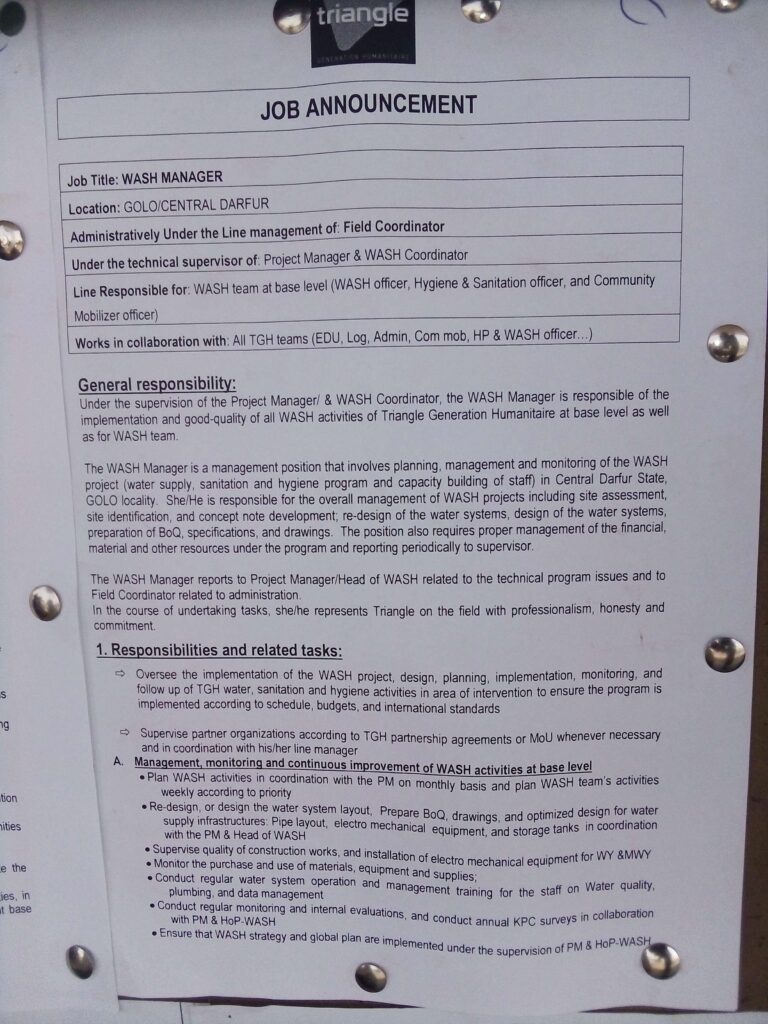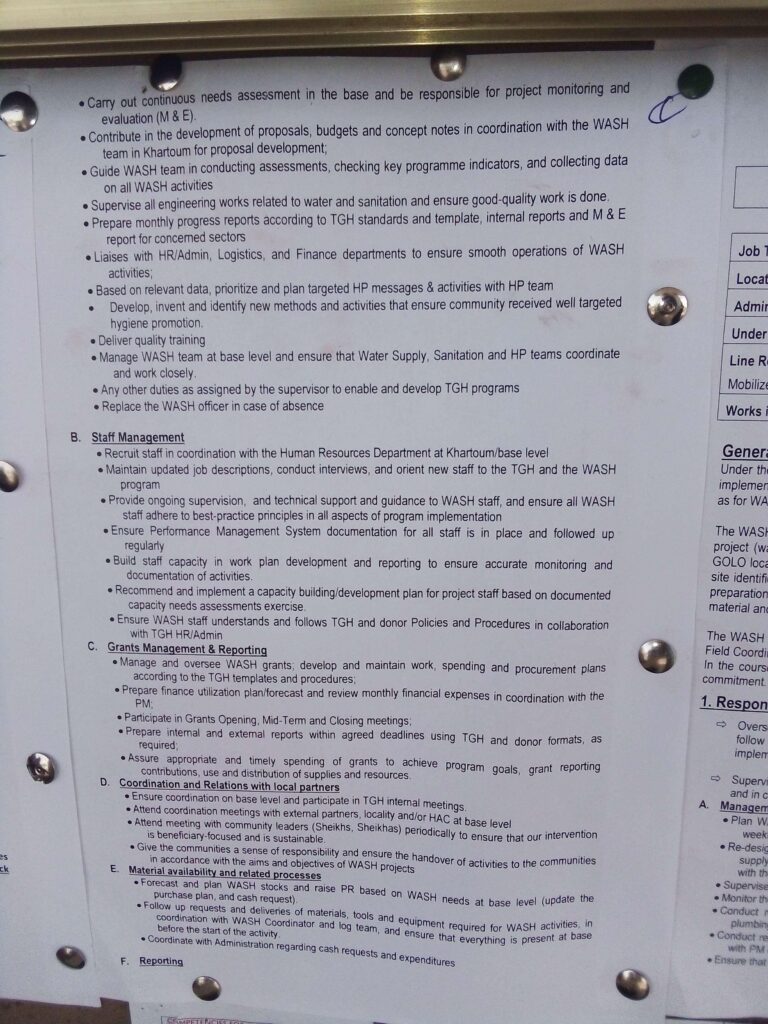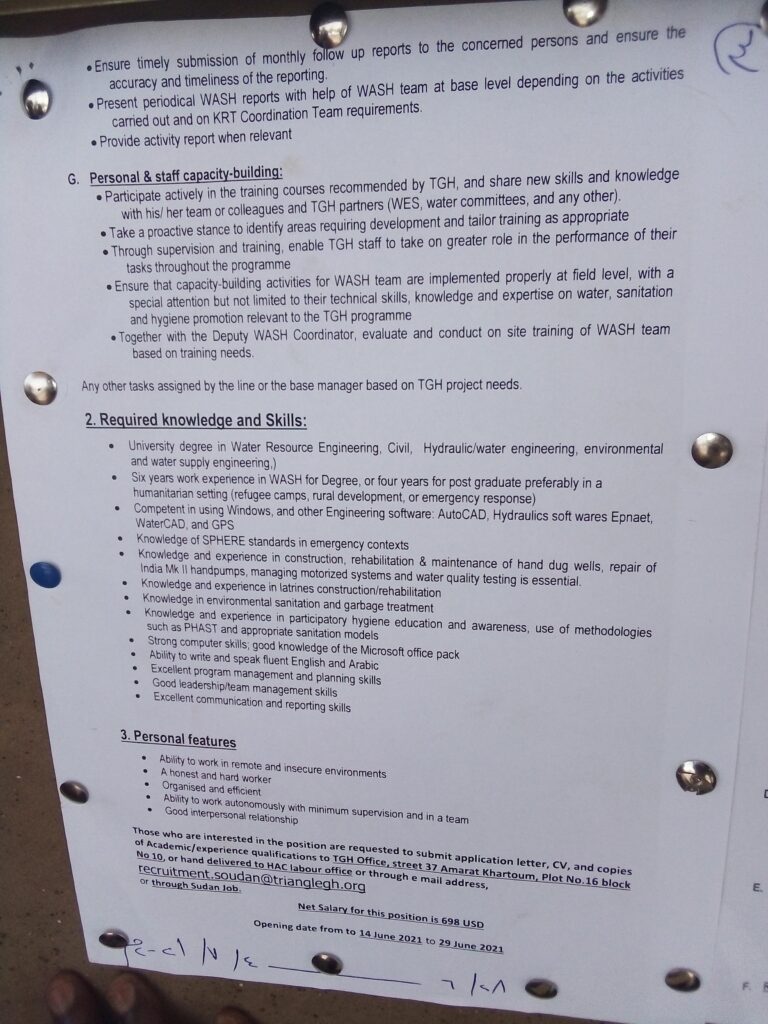Job Description
| Job Title: | WASH MANAGER |
| Location: | GOLO/CENTRAL DARFUR |
| Administratively Under the Line management of: | Field Coordinator |
| Under the technical supervisor of: | Project Manager & WASH Coordinator |
| Line Responsible for: | WASH team at base level (WASH officer, Hygiene & Sanitation officer, and Community Mobilizer officer) |
| Works in collaboration with: | All TGH teams (EDU, Log, Admin, Com mob, HP & WASH officer…) |
| Closing Date: | 04/07/2021 |
| Net Salary: | 698 USD |
General responsibility:
Under the supervision of the Project Manager/ & WASH Coordinator, the WASH Manager is responsible of the implementation and good-quality of all WASH activities of Triangle Generation Humanitaire at base level as well as for WASH team.
The WASH Manager is a management position that involves planning, management and monitoring of the WASH project (water supply, sanitation and hygiene program and capacity building of staff) in Central Darfur State, GOLO locality. She/He is responsible for the overall management of WASH projects including site assessment, site identification, and concept note development; re-design of the water systems, design of the water systems, preparation of BoQ, specifications, and drawings. The position also requires proper management of the financial, material and other resources under the program and reporting periodically to supervisor.
The WASH Manager reports to Project Manager/Head of WASH related to the technical program issues and to Field Coordinator related to administration.
In the course of undertaking tasks, she/he represents Triangle on the field with professionalism, honesty and commitment.
Responsibilities and related tasks:
- Oversee the implementation of the WASH project, design, planning, implementation, monitoring, and follow up of TGH water, sanitation and hygiene activities in area of intervention to ensure the program is implemented according to schedule, budgets, and international standards
- Supervise partner organizations according to TGH partnership agreements or MoU whenever necessary and in coordination with his/her line manager
A. Management, monitoring and continuous improvement of WASH activities at base level
- Plan WASH activities in coordination with the PM on monthly basis and plan WASH team’s activities weekly according to priority
- Re-design, or design the water system layout, Prepare BoQ, drawings, and optimized design for water supply infrastructures: Pipe layout, electro mechanical equipment, and storage tanks in coordination with the PM & Head of WASH
- Supervise quality of construction works, and installation of electro mechanical equipment for WY &MWY
- Monitor the purchase and use of materials, equipment and supplies;
- Conduct regular water system operation and management training for the staff on Water quality, plumbing, and data management
- Conduct regular monitoring and internal evaluations, and conduct annual KPC surveys in collaboration with PM & HoP-WASH
- Ensure that WASH strategy and global plan are implemented under the supervision of PM & HoP-WASH
- Carry out continuous needs assessment in the base and be responsible for project monitoring and evaluation (M & E).
- Contribute in the development of proposals, budgets and concept notes in coordination with the WASH team in Khartoum for proposal development;
- Guide WASH team in conducting assessments, checking key programme indicators, and collecting data on all WASH activities
- Supervise all engineering works related to water and sanitation and ensure good-quality work is done.
- Prepare monthly progress reports according to TGH standards and template, internal reports and M & E report for concerned sectors
- Liaises with HR/Admin, Logistics, and Finance departments to ensure smooth operations of WASH activities;
- Based on relevant data, prioritize and plan targeted HP messages & activities with HP team
- Develop, invent and identify new methods and activities that ensure community received well targeted hygiene promotion.
- Deliver quality training
- Manage WASH team at base level and ensure that Water Supply, Sanitation and HP teams coordinate and work closely.
- Any other duties as assigned by the supervisor to enable and develop TGH programs
- Replace the WASH officer in case of absence
B. Staff Management
- Recruit staff in coordination with the Human Resources Department at Khartoum/base level
- Maintain updated job descriptions, conduct interviews, and orient new staff to the TGH and the WASH program
- Provide ongoing supervision, and technical support and guidance to WASH staff, and ensure all WASH staff adhere to best-practice principles in all aspects of program implementation
- Ensure Performance Management System documentation for all staff is in place and followed up regularly
- Build staff capacity in work plan development and reporting to ensure accurate monitoring and documentation of activities.
- Recommend and implement a capacity building/development plan for project staff based on documented capacity needs assessments exercise.
- Ensure WASH staff understands and follows TGH and donor Policies and Procedures in collaboration with TGH HR/Admin
C. Grants Management & Reporting
- Manage and oversee WASH grants; develop and maintain work, spending and procurement plans according to the TGH templates and procedures;
- Prepare finance utilization plan/forecast and review monthly financial expenses in coordination with the PM;
- Participate in Grants Opening, Mid-Term and Closing meetings;
- Prepare internal and external reports within agreed deadlines using TGH and donor formats, as required;
- Assure appropriate and timely spending of grants to achieve program goals, grant reporting contributions, use and distribution of supplies and resources.
D. Coordination and Relations with local partners
- Ensure coordination on base level and participate in TGH internal meetings.
- Attend coordination meetings with external partners, locality and/or HAC at base level
- Attend meeting with community leaders (Sheikhs, Sheikhas) periodically to ensure that our intervention is beneficiary-focused and is sustainable.
- Give the communities a sense of responsibility and ensure the handover of activities to the communities in accordance with the aims and objectives of WASH projects
E. Material availability and related processes
- Forecast and plan WASH stocks and raise PR based on WASH needs at base level (update the purchase plan, and cash request).
- Follow up requests and deliveries of materials, tools and equipment required for WASH activities, in coordination with WASH Coordinator and log team, and ensure that everything is present at base before the start of the activity.
- Coordinate with Administration regarding cash requests and expenditures
F. Reporting
- Ensure timely submission of monthly follow up reports to the concerned persons and ensure the accuracy and timeliness of the reporting.
- Present periodical WASH reports with help of WASH team at base level depending on the activities carried out and on KRT Coordination Team requirements.
- Provide activity report when relevant
G. Personal & staff capacity-building:
- Participate actively in the training courses recommended by TGH, and share new skills and knowledge with his/ her team or colleagues and TGH partners (WES, water committees, and any other).
- Take a proactive stance to identify areas requiring development and tailor training as appropriate
- Through supervision and training, enable TGH staff to take on greater role in the performance of their tasks throughout the programme
- Ensure that capacity-building activities for WASH team are implemented properly at field level, with a special attention but not limited to their technical skills, knowledge and expertise on water, sanitation and hygiene promotion relevant to the TGH programme
- Together with the Deputy WASH Coordinator, evaluate and conduct on site training of WASH team based on training needs.
Any other tasks assigned by the line or the base manager based on TGH project needs.
3.Required knowledge and Skills:
- University degree in Water Resource Engineering, Civil, Hydraulic/water engineering, environmental and water supply engineering,)
- Six years work experience in WASH for Degree, or four years for post graduate preferably in a humanitarian setting (refugee camps, rural development, or emergency response)
- Competent in using Windows, and other Engineering software: AutoCAD, Hydraulics soft wares Epnaet, WaterCAD, and GPS
- Knowledge of SPHERE standards in emergency contexts
- Knowledge and experience in construction, rehabilitation & maintenance of hand dug wells, repair of India Mk II handpumps, managing motorized systems and water quality testing is essential.
- Knowledge and experience in latrines construction/rehabilitation
- Knowledge in environmental sanitation and garbage treatment
- Knowledge and experience in participatory hygiene education and awareness, use of methodologies such as PHAST and appropriate sanitation models
- Strong computer skills; good knowledge of the Microsoft office pack
- Ability to write and speak fluent English and Arabic
- Excellent program management and planning skills
- Good leadership/team management skills
- Excellent communication and reporting skills
2.Personal features
- Ability to work in remote and insecure environments
- A honest and hard worker
- Organised and efficient
- Ability to work autonomously with minimum supervision and in a team
- Good interpersonal relationship
Those who are interested in the position are requested to submit application letter, CV, and copies of Academic/experience qualifications to TGH Office, street 37 Amarat Khartoum, Plot No.16 block No 10, or hand delivered to HAC labour office
or through email address,
recruitment.soudan@trianglegh.org
Net Salary for this position is 698 USD
Opening date from to 28 June 2021 to 04 July 2021
Triangle Generation Humanitaire (tgh) in Sudan
The lifting in 2018 of US economic sanctions applied since 1997 has not had the expected effect on the country’s economy, which is mainly dependent on imports.
Deprived of about 75% of the oil resources now located in Southern Sudan since its independence in 2011, Sudan is facing soaring inflation that has caused several devaluations of its currency in 2018, with a direct impact on the living conditions of rural and urban population.
The decrease in armed clashes between rebel groups and government forces seems to be confirmed in Darfur, with the United Nations announcing the withdrawal of the peacekeeping mission in the region (UNAMID) in 2020.
On the ground, this improvement in the security situation and the signing of a tripartite agreement between the Chadian and Sudanese governments and the United Nations refugee agency announce an acceleration in the return of refugees who have fled the conflict.
Meanwhile, sporadic clashes between rebels and the government (particularly in the Jebel Marra area) or between different tribes continue to occur regularly. In addition, the consequences of climatic disorders (floods, drought and fires) call for the maintenance of an emergency response capacity.
Acting in Sudan since 2004, TGH has rapidly expanded its programs in Central and West Darfur, despite a constantly precarious and complex situation.
From its six bases in Darfur and the one, established in 2020, in South Kordofan, the NGO continuously monitors humanitarian needs and identifies priorities for action. It can thus respond quickly to both new emergency situations in coordination with other humanitarian actors, local authorities and national partners, and have a solid knowledge of the structural problems affecting populations.
In West Darfur, TGH works with vulnerable populations affected by the conflict, and mitigates the effects of chronic emergencies due to lack of access to some basic services or natural disasters.
TGH’s multisectoral contribution saves lives while focusing on the empowerment of populations and the prospects for the return of displaced people.
TGH is strengthening the technical and material resources to boost agricultural and micro-economic activities in Geneina and Kreinik. In cooperation with local stakeholders, these actions help improve cereal and market gardening production as well as a safe environment for the beneficiary populations.
In Central Darfur, TGH is strengthening sanitation and access to safe drinking water in the Golo town (Jebel Marra). This action complements the responses provided in Golo and elsewhere to food security needs: delivery of agricultural equipment, training or home garden activities (for self-consumption).
TGH also supports returnees in Um Dukhun for access to basic services: education, water access (through community management of the infrastructure it has built), and development of sustainable livelihoods.
Finally, TGH is opening a new project in consortium with the NGO Première Urgence Internationale (PUI) in the sub-district of El Abassiya in South Kordofan. Indeed, the region has suffered from conflicts, pitting the predominantly Muslim populations in the North of the country against those in the South, who are mostly Christian and animist, since Sudan’s independence in 1956. These clashes have been characterized by massive population displacements, a drop in agricultural production impacting food security, a deterioration of basic services including reduced access to drinking water and a deterioration of education and health services. TGH teams are therefore actively working to provide adequate and sufficient water access to the population as well as to facilitate access to an improved school environment and sustainable learning conditions for students in the targeted localities. At the same time, the NGO PUI ensures the improvement and access to health services in particular by strengthening the technical platforms of health facilities, by supporting prevention activities or by building the capacity of health staff through trainings.
From 2020, as in most countries, the health situation in Sudan has deteriorated due to the COVID-19 epidemic. Due to a lockdown that lasted several months, much of the activities underway during the first wave of the virus had to be suspended by TGH. As a result, the majority of programmes in Sudan had had to adapt in order to complete the planned activities in compliance with the recommended barrier gestures and hygiene measures.





